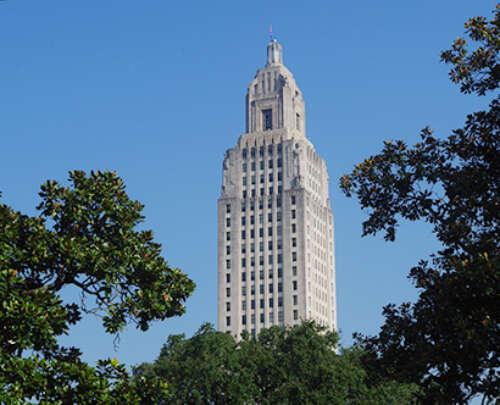
Conservative state politicians have been dying to get a piece of the anti-immigrant animus that motivates a portion of the Republican base. Louisiana legislators have got their toes wet in the current legislative session with two bills that are far less benign than they seem on the surface.
Senate Bill 91 (SB91) would both prohibit anyone who is not a U.S. citizen or green card holder and is a citizen of “foreign adversaries” from purchasing immovable property near military bases and other sensitive locations. Under the bill, foreign nationals from “People's Republic of China and the Hong Kong Special Administrative Region, Republic of Cuba, Islamic Republic of Iran, Democratic People's Republic of Korea, Russian Federation, and Venezuela under the leadership of Nicolas Maduro” would not be able to “purchase, lease, possess, exercise any control, or hold any interest in immovable property located within fifty miles of any federal or state military land, reservation, camp, post, base, installation, armory, or training area; any weather station operated by the armed forces of the United States; or any facility operated by the Civil Air Patrol.”
That sounds grimly rational in a Cold War, Spy vs. Spy kind of way. It assumes foreign nationals from these countries remain loyal to them when, in our experience, it’s far more common that they are looking for opportunities that aren’t available to them in the countries they left. It is certainly possible that there are spies from those countries in Louisiana, but it’s probable that most of the foreign nationals in question aren’t. The bill is prepared to punish those interested in an American way of life to stop the hostile actors that might be in our midst.
If thought through, the gross impracticality and inhumanity of SB91 becomes clear. In the New Orleans area, a 50-mile radius from the Naval Air Station Joint Reserve Base in Belle Chasse would not only prevent people from the designated countries from buying a house in New Orleans but in Mandeville on the other side of Lake Pontchartrain, which is 47 miles away. But, since there is U.S. National Guard base in Hammond, Covington would be out of the picture as well. If people from the affected countries wanted to go west, there is a nine-mile window before they get too close to the National Guard base in Plaquemine, Louisiana. Take a map and a compass and draw 50-mile circles around the protected military properties and you find small, rural windows where immigrants from the named countries could live. Whether they could earn a living from those locations is debatable.
SB91 might be both more and less paranoid than House Bill 537 (HB537). It goes further by prohibiting the same “foreign adversaries” from purchasing immovable property in Louisiana period. But, it would not affect “a person who is not a United States citizen but is a permanent legal resident or is lawfully present in the United States by virtue of having a valid visa issued by the United States Citizenship and Immigration Services, including but not limited to a student or employment visa.” Since that exception is poorly written, it leaves some questions open to interpretation, including whether or not it would pertain to those who have applied for a status change but not yet received it. Or, whether it would pertain to Venezuelan with TPS and Cubans with immigration parole—federal policies that offer special protections to people from those countries because we view their countries as being unsafe and/or unstable.
Both bills give legislators a chance to take what seem like easy votes as they take what they consider patriotic stands against China and Russia. Unfortunately, HB543 and SB91 won’t affect those countries’ political leaders nearly as much as people leaving those countries with hopes of starting new lives here. The harshness of the stances allow the politicians to flex their muscles at a time when much of the Republican Party is in love with drawing hard lines and showing strength in cartoonish ways.
If you want to help, let your legislators know that you oppose this return to Cold War paranoia and Louisiana getting involved in immigration. Our biggest concern in the office is that as toxic as these bills are, they are likely just the first step. If legislators can successfully write laws that make it harder for one group of immigrants to move to Louisiana, they can explore other ways to use state law to discourage immigration. Since immigration is good for business, the state is shooting itself in the foot—again—by doing so.
Are you having legal issues with Immigration? Do you need legal representation?